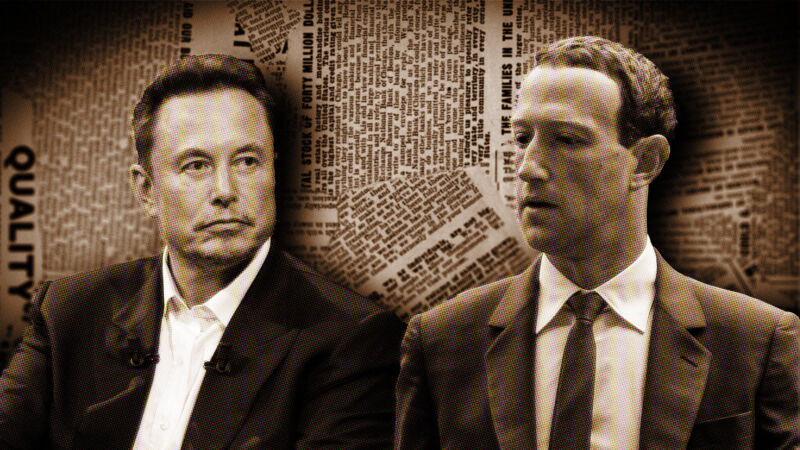
The Internet is aflame this morning with the prospect of a cage match between two of the tech industry's most prominent and controversial leaders. Ready to rumble in the red corner is Tesla and SpaceX founder Elon Musk. And in the blue corner, we have the founder of Facebook, Mark Zuckerberg.
As the BBC and multiple other outlets have confirmed, Zuckerberg was entirely serious when he accepted Musk's offer of a cage match by saying "send me location." On Wednesday evening, Musk then replied with "Vegas Octagon." This was a reference to the fenced-in area used for Ultimate Fighting Championship bouts in Las Vegas.
Given the humorous nature of Musk's other responses to the proposed fight, such as "I have this great move that I call 'The Walrus', where I just lie on top of my opponent & do nothing," it seems probable that he is not overly serious. While Musk has the definite advantage in size, he is 12 years older than Zuckerberg, and the Facebook founder frequently trains in mixed-martial arts.
Nonetheless, the feud between the two tech billionaires is absolutely legitimate. And what most of the coverage of this "cage match" exchange has missed is the origin of the dispute. It came nearly seven years ago when Facebook leased part of the bandwidth on an Israeli-built satellite, Amos-6. Zuckerberg intended for this bandwidth to provide some areas of Africa with Internet access to Facebook.
Starts with a rocket
This $200 million satellite was due to launch on a Falcon 9 rocket in early September, 2016. On the morning of September 1, to save a single day in the pre-launch preparation process, SpaceX had already affixed the satellite atop a Falcon 9 rocket ahead of its static fire test. And the countdown was going smoothly, until it wasn't. Completely out of the blue, the rocket exploded violently, showering pieces of the vehicle into the swamplands for miles around. The satellite swan-dived to the ground, a total, fiery loss.
The Amos-6 accident—known internally at SpaceX as "Flight 29"—was a wrenching failure for a launch company. With the destruction of the Space Launch Complex-40 pad, SpaceX had no other pads in service at the time, and it had no rockets to launch. Additionally, it was the company's second Falcon 9 failure in 15 months.
Musk was sleeping at his home in Los Angeles at the time of the accident. He awoke to the news of the failure and arrived at the SpaceX factory in Hawthorne, California, about the same time that Zuckerberg took to Facebook to vent his frustrations.
"As I'm here in Africa, I'm deeply disappointed to hear that SpaceX's launch failure destroyed our satellite that would have provided connectivity to so many entrepreneurs and everyone else across the continent," Zuckerberg wrote.
This was not well received at SpaceX, where employees were distraught and pulling themselves together to begin their second failure investigation in a little more than a year. The sentiment shared by Musk, the company's president, Gwynne Shotwell, and others was essentially that Zuckerberg was an "asshole" for what he had written, and when he had done so.
Delete Facebook
The emerging feud took another step forward a couple of years later when Musk deleted the Facebook pages for SpaceX and Tesla amid the ongoing Cambridge Analytica scandal. This was in March 2018, when it was revealed that a British data firm that contracted with the Donald Trump presidential campaign had retained private data from 50 million Facebook users despite claiming to have deleted it.
Essentially, Musk piled onto the "Delete Facebook" movement, saying he "didn’t realize" that SpaceX even had a Facebook page and that Tesla’s "looked lame anyway." The two pages were promptly taken down.
The tensions between the two billionaires have ratcheted up over the last year as Musk began his adventures in Twitterland as a social media overlord. This brought him into direct competition with Facebook. Zuckerberg has responded by saying Facebook is working on its own version of a service like Twitter.
Reader Comments (390)
View comments on forumLoading comments...